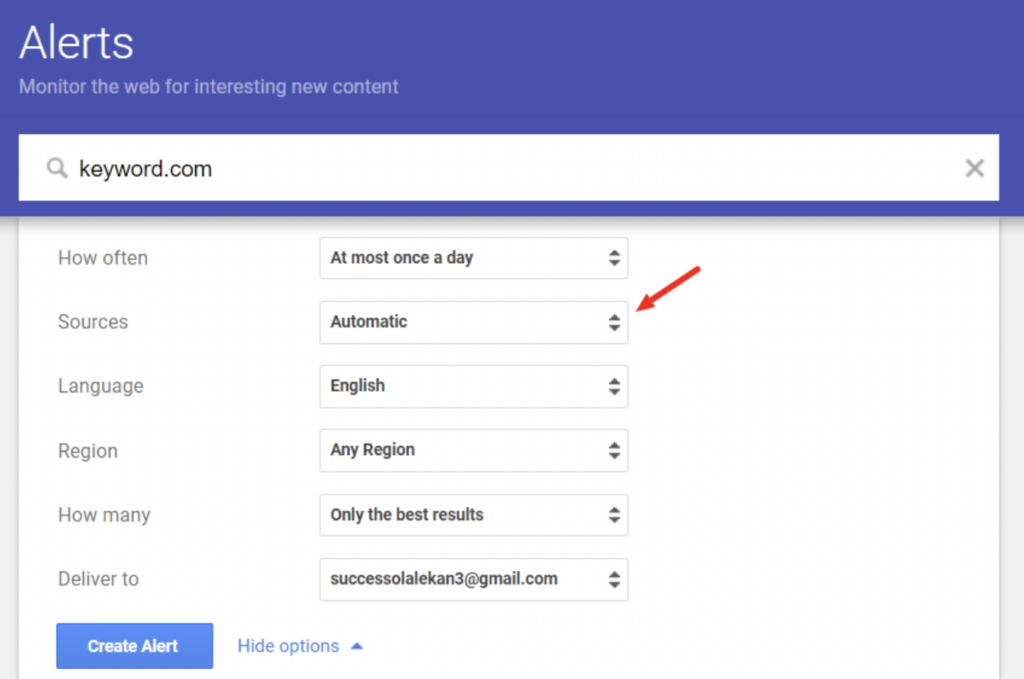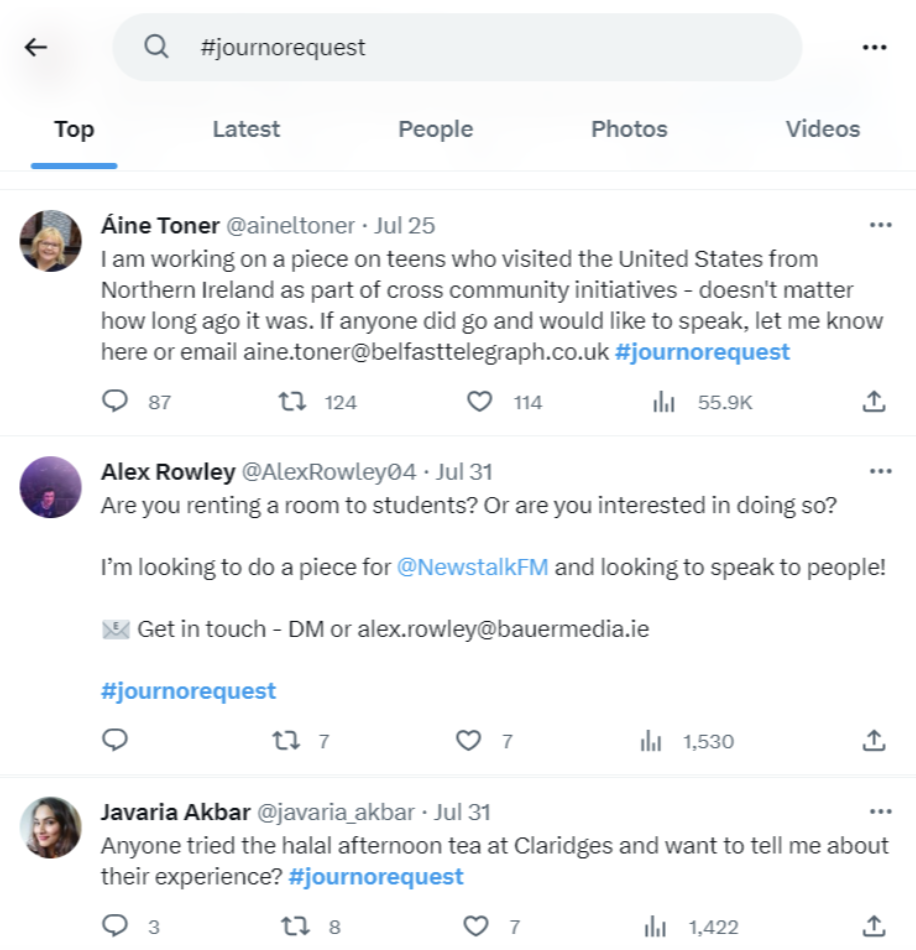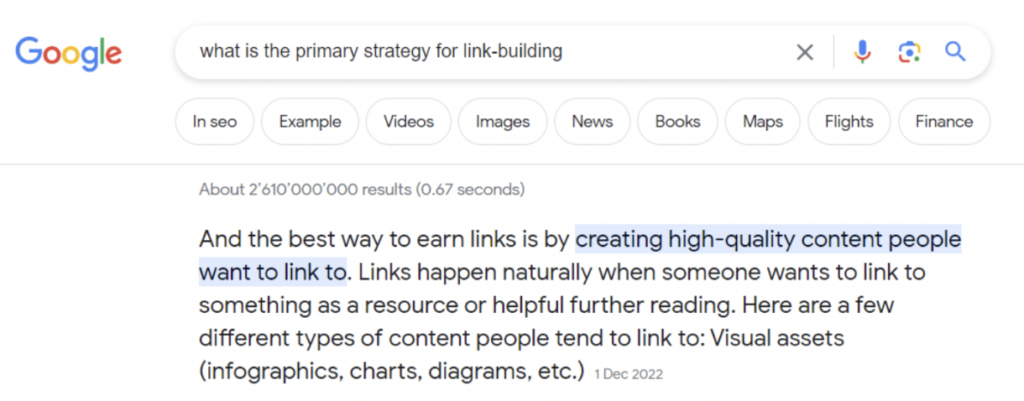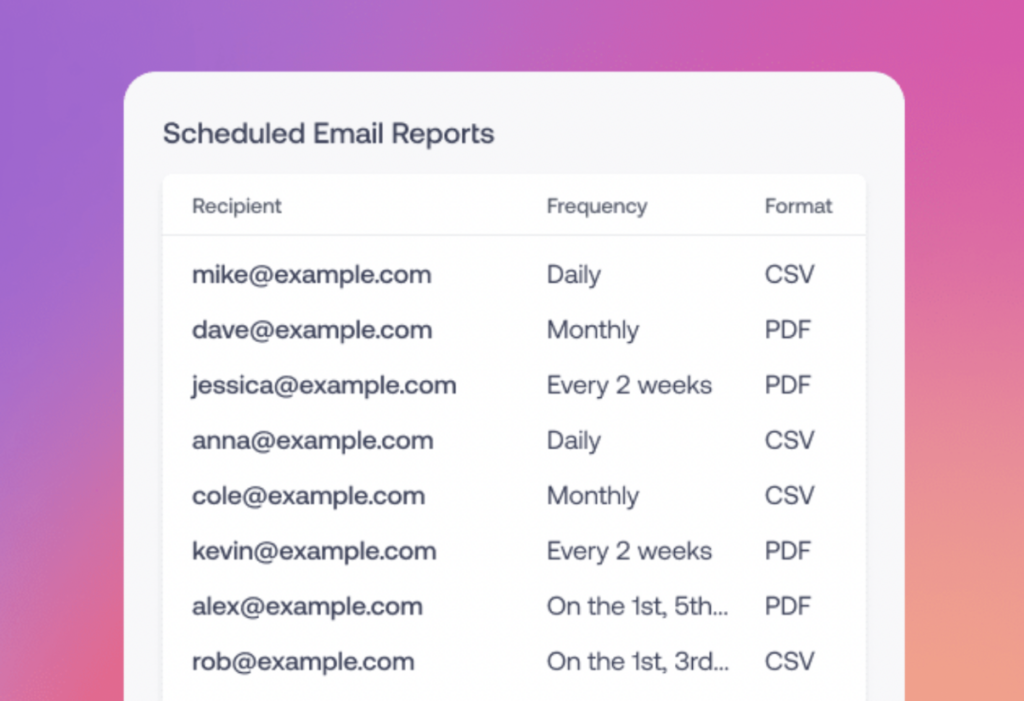A common challenge for businesses striving to create a real estate on search engine result pages is knowing what tactics drive the highest returns. And if you look at local SEO organic and map pack studies, they all highlight links as a crucial ranking factor.
Why?
A local link profile showcases a site’s authority and trustworthiness, which is important to Google. So, if you want to increase your business’s visibility on SERPs, you need backlinks. This article will take you through the top local link-building strategies vetted and trusted by other businesses.
14 Local Link Building Strategies
1. Creating Link-Bait Local Content
Link-bait content is designed to attract backlinks. They are primarily guides, statistical content, and newsworthy content.
Primarily, link-bait content is value-focused content designed to satisfy search intent completely. This type of content differs from the generic content created to build a wall of text to meet a desired word count.
You could create several types of link-bait content; however, make sure you choose one relevant to your business.
Some ideas include
- A guide to local {niche} hotspots
- A searchable map of local attractions
- A local events calendar
- Press release about a local event
- Local statistics of your {industry type}
- A comprehensive review page of local {industry type}
Your niche is your industry. It could be a travel and guide business, restaurant, carpentry, or plumbing service.
For instance, if you offer a plumbing service, you can create a blog post on the top 10 plumbers in your local area, a guide on how to hire a plumber in your local area, or statistics on plumbers earning in your local area.
If created following Google’s E-E-A-T guidelines, this type of content can generate links from other local businesses in your local space.
2. Build Link Building Partnership With Other Local Businesses
Do you know there are local businesses that have websites open to Local Partners Page? The purpose of these opportunities is to get a link back to your site.
The problem many local business owners have is that they consider the organic traffic of other local sites in their geographical and turn down partnerships.
As far as local SEO is concerned, your success is based on how you can dominate the confines of your market.
Search Engine Journal stated that “Even if a website has a low DA, getting a link from them might be more valuable than from Forbes, Huffington Post, or The New York Times simply because they have influence in and are relevant to your small market.”
NOTE: We aren’t saying getting links from authoritative sites outside the radius of your market is wrong but prioritize links within the confines of your local space.
For these types of links, you need to reach out. Call and send emails requesting a link exchange, stating what the other party will get in return.
Here is an email format to help in your link-building outreach effort:
Subject: Collaboration Opportunity for Local Link Building: [Your Website/Project Name]
Dear [Recipient’s Name],
I hope this email finds you well. My name is [Your Name], and I am reaching out on behalf of [Your Website/Project Name]. We are a [brief description of your website/project and its purpose] based in [Your City/Location]. I came across your website, [Recipient’s Website], and I was impressed by the valuable content you provide to your audience.
We want to expand our network of local partners and enhance our online presence through link-building. Collaborating with local businesses and organizations like yours would benefit us and create a mutually advantageous relationship. By linking to each other’s websites, we can improve our search engine rankings, increase organic traffic, and provide valuable resources to our respective audiences.
Here are a few ways we could collaborate:
- Guest Posts
- Resource Sharing
- Interviews or Features
- Collaborative Content
We are committed to maintaining the highest quality standards and adhering to ethical link-building practices.
Please let us know if you are interested in exploring this collaboration opportunity or have any other ideas. We are open to discussing any other partnership that aligns with your goals.
Thank you for considering our proposal. By working together, we can positively impact our local online community.
Looking forward to hearing from you soon.
Best regards,
[Your Name]
3. Guest Post on Local Blogs
Guest posting is a popular local SEO strategy where business owners create and publish articles on someone else’s blog.
“ Guest posting on local blogs involves generating locally relevant content, such as guides to community events or blog posts spotlighting local attractions. We then offer this content as a useful resource to local websites and news outlets, providing value to their readers and potentially securing a link back to our site.” Sudhir Khatwani, Director of The Money Mongers, Inc
This approach benefits the guest blogger and the blog owner by providing mutual advantages. The guest blogger gets a link to their website, while the blog owner enjoys the benefit of the article published on their site.
To get guest post opportunities, pitch local bloggers stating your guest post content ideas and how it can benefit their audience and create mutual advantage.
4. Local Sponsorships
This approach involves supporting local entities, from charities to sports clubs, who often provide website links in return for sponsorship. Actively look for local sponsorship opportunities, enabling you to contribute to the community while securing a high-quality, localized link.
5. Local Directory Listing
Local business directories are online platforms that list and provide information about businesses operating within specific geographic areas. Examples are Google Business Profile, Yelp, TripAdvisor, Foursquare, Manta, Superpages, and more.
You can also head over to Google to look for more industry-specific directories. Search “{Your area}{Industry type} directory,” and you will have a list of results relevant to your industry.
However, to get listed, you must provide essential information about your business, such as its name, address, phone number (NAP), website, hours of operation, and sometimes customer reviews and ratings. These citations act as backlinks to your business’s website.
Some local directories may offer the option to include a link to your website within the listing. While not all directories provide this option, those that do can directly contribute to your link profile. Links from these platforms are more trustworthy and will likely pass SEO juice to your site.
Most importantly, local directory listings put your business before potential customers actively searching for local services. This level of exposure can lead to more organic mentions and links from other websites.
6. Hosting Community Events
By organizing and detailing a local event on your website, local news sites, blogs, and community websites can link back to your page to provide their readers with more information.
7. Leverage Social Media Platforms
Social media provides a platform for businesses to engage with other local businesses, organizations, and influencers. A company can establish relationships that lead to link opportunities by following, interacting, and collaborating with them. More so, creating valuable and shareable content on social media can attract the attention of local audiences, encouraging them to link to the content in their blog posts or website articles.
8. Digital PR and Commentary
“We provided expert commentary on Google updates to earn backlinks from press publications. As this is related to what the company does, it allowed reporters and publishers to write commentary around major Google updates. This helps build authority while also earning backlinks for the company.” Methuselah Marava, Digital Marketing and PR at UpMention.
9. Become Active in Local Forums
Local forums are the homes of local business owners. They use these platforms to share tips and advice, ask questions, make announcements, and talk about the latest trends in their local industry. Some local forums even feature a business directory where members can provide their company’s information. Most of these forums are authoritative and can rank for keywords you can achieve by yourself, increasing your visibility and attracting potential link opportunities.
Also, engaging with local forum members allows you to build relationships with other businesses, influencers, and community members who can create a link exchange partnership with you.
Lastly, being an active and helpful participant in discussions can lead to others linking to your website or mentioning your business in their content. You can also share links to your content that provides valuable information or answer questions when relevant to the conversation. Other forum members may link to the content on their websites or share it on social media if the content is helpful.
10. Claim Unlinked Mentions
Keep an eye on forum discussions, social media, or other platforms to see if other members mention or link your business. If you find a mention without a link, you can reach out to the business owner and request the addition of a link to your website.
This process appears challenging, but you can automate the process with Google Alerts. This tool notifies you each time your site is mentioned on the internet with a setting feature that allows you to choose the sources you want to be notified about.
So, each time you receive an alert, you can check if the site links to you. If you need help, you can contact the site owner to make the necessary adjustment.
11. Analyze Your Local Competitors’ Backlinks
Checking your competitors’ backlinks is a quick hack to building your link profile.
If a site can provide a link to your competitors, there’s a guarantee that they can do the same to you too. But you need an SEO competitive analysis tool to make the process easy and achieve more in less time. This software provides insights into your competitors’ winning strategies, especially backlinks details to replicate them for better results.
Note: You need to understand your local competitors before giving your whole energy to this process. A local restaurant analyzing its site with Forbes to compare backlinks profiles is like an ant competing with a cheetah in a race; it will take forever to reach that feat.
12. Use Journalist Request Platforms
Be on the watch for journalists looking for quotes on local topics. You can provide insight into these topics since it’s your area of expertise, or you have a page on your site that covers that topic. If your insight is accepted, these journalists link your site.
You can maximize platforms like HARO, Qwoted, and Helpab2bwriter. These platforms feature hundreds of content creators that request expert insights daily.
You can also enter the hashtag “journorequest” on Twitter to see more journalist requests.
13. Leverage Testimonial Link Building Strategy
When you recommend a local business or service you have used, you create a testimonial link. The company links to your website from your recommendation on its website, and the company gains by showcasing how reliable its services are to its prospects.
Note: Providing recommendations to businesses you haven’t used their service before or can’t validate their product to get a link from them is a black hat local SEO strategy. You are causing more harm than good because if the business isn’t trustworthy, you can allow others to make a wrong decision.
14. Create a Calendar Network
Brooks Conkle, Managing Member at Kea Marketing LLC, explains this local SEO strategy in detail.
He told us,
“One of the ways that I’ve created links is by creating a ‘calendar network’ by networking with other webmasters in my area.
Local organizations have event calendars on their websites, but they only sometimes cover all events.
So, I network and deal with multiple area websites with online calendars and agree to link to each other’s calendars.”
Common Mistakes Made in Local Link Building
1. Ignoring Local Relevance
One of the vital aspects of local link building is to focus on getting links from locally relevant sources. Many people make the mistake of focusing on acquiring links from websites that are not related to their business or location.
For example, links from a restaurant have no impact on the local search ranking of a photography site. Likewise, doing business in Richmond, Texas, and getting links and traffic from Singapore does not affect your local ranking.
2. Focusing Solely on Quantity
Quantity is essential, but it should not be the sole focus of your link-building efforts. Building numerous low-quality links from irrelevant or spammy sources can harm your website’s reputation and rankings. Instead, prioritize quality over quantity and seek links from authoritative and relevant local sources.
3. Neglecting Google My Business (GMB) Optimization
Google My Business is a critical tool for local businesses, and optimizing your GMB profile is crucial for local search visibility. Many companies overlook this step and miss valuable local link opportunities from other local businesses’ GMB profiles.
4. Using Black Hat Tactics
Engaging in black hat SEO practices, such as buying links, participating in link schemes, or using automated link-building tools, can lead to severe penalties from search engines. Following Google’s guidelines and focusing on organic white hat link-building strategies is essential.
That’s why Bryan Clayton, CEO of GreenPal, said,
“Buying links might seem like a quick fix, but Google’s algorithm is smarter than we give it credit for. If you’re caught buying links, you risk getting a penalty, which can be devastating.”
5. Overlooking Local Partnerships
Building relationships with other local businesses and organizations can significantly secure relevant and valuable links. Many companies must take advantage of local partnership opportunities that could result in high-quality links and increased brand exposure.
6. Not Diversifying Anchor Text
Anchor text is the clickable text that contains the link to your website. Using the exact anchor text excessively can appear unnatural and might lead to a penalty from search engines. Diversify your anchor text with relevant variations to maintain a natural link profile.
7. Ignoring Competitor Analysis
Analyzing your competitors’ link profiles can provide valuable insights into the types of local websites and directories relevant to your niche. Ignoring competitor analysis means missing out on potential link opportunities that they might be utilizing.
8. Lack of Follow-up
Sometimes, outreach efforts for local link-building may yield little results. Many fail to follow up on initial outreach attempts, missing the chance to establish valuable partnerships.
9. Neglecting Content Quality
We quickly searched Google for the primary strategy for link-building. Here is the result of the Featured Snippet.
Creating high-quality content is essential for attracting natural and authoritative links. Neglecting content quality is like dashing 40% of potential links into the ditch.
How Can You Monitor the Success of Your Local Link Building Efforts
The best way to achieve your goals is by having Key Performance Indicator (KPI).
Your local link-building KPIs should be increased organic traffic, improved local search rankings, and the number of new referring domains linking to your website.
You can use a free tool like Google Search Console to analyze your website’s organic traffic. The tool provides the number of impressions, clicks, click-through rate, and the average position of your keywords on SERPs.
However, you can’t beat local keyword ranking fluctuations by using Google Search Console alone because you need to login into your account repeatedly to analyze your keyword performance. Moreso, there isn’t a detailed segmented ranking by country, city, or ZIP code.
That’s why keyword.com receives new signups daily.
Keyword.com is a keyword monitoring tool with a local rank-tracking feature. This tool tracks your local SERP keyword rankings with automatic email-scheduled reports showing accurate rankings. You can adjust your report frequency to daily, weekly, monthly, or a specific day. Alternatively, Keyword offers a live keyword ranking dashboard that you can share with your team or clients.
Additionally, the report showcases your actual local competitors with strategies to outrank them. This local rank tracker provides local SERP and keyword ranking reports from street to street with verifiable accuracy.
These features make it easy for business owners to know when there are changes in rankings and propel prompt actions before it’s too late. Try our free trial to share your wins with your clients or team members.
How Long Does It Take to See Results from Local Link Building?
Jonathan Merry, CEO at Moneyzine, explained something explicit here.
He said,
“SEO IS NOT AN OVERNIGHT SERVICE, and there is no way to get results quickly unless there is no competition. We frequently advise our clients not to wait for results during the first six months.”
But why, you ask?
Several factors affect the success of a local link-building effort, such as the competitiveness of your local market, the quality of the links acquired, the website’s overall SEO, and more.
It takes time to see accurate results from local link building. There is no standard timeframe because the limiting factors vary from site to site.
For instance, in a case study by linkbuilder.io, they shared how they started a link-building campaign for one of their clients and hit peak traffic after eleven months.
“When we came on board, the site received around 300 monthly search traffic visits.
We started sending links to the page in March and quickly amassed around 20 links.
Over the following months, traffic increased to the page as it improved its ranking for more and more keywords. Traffic doubled to around 600 visits per month by July, and it received a high of 937 monthly views in February the following year (although other factors like the site’s age contributed to this success, link-building played a significant role).”
Final Words
Local link building can be complex. Make sure you prioritize the strategies discussed in this article and other local SEO ranking factors to increase your business’s visibility and customers.



